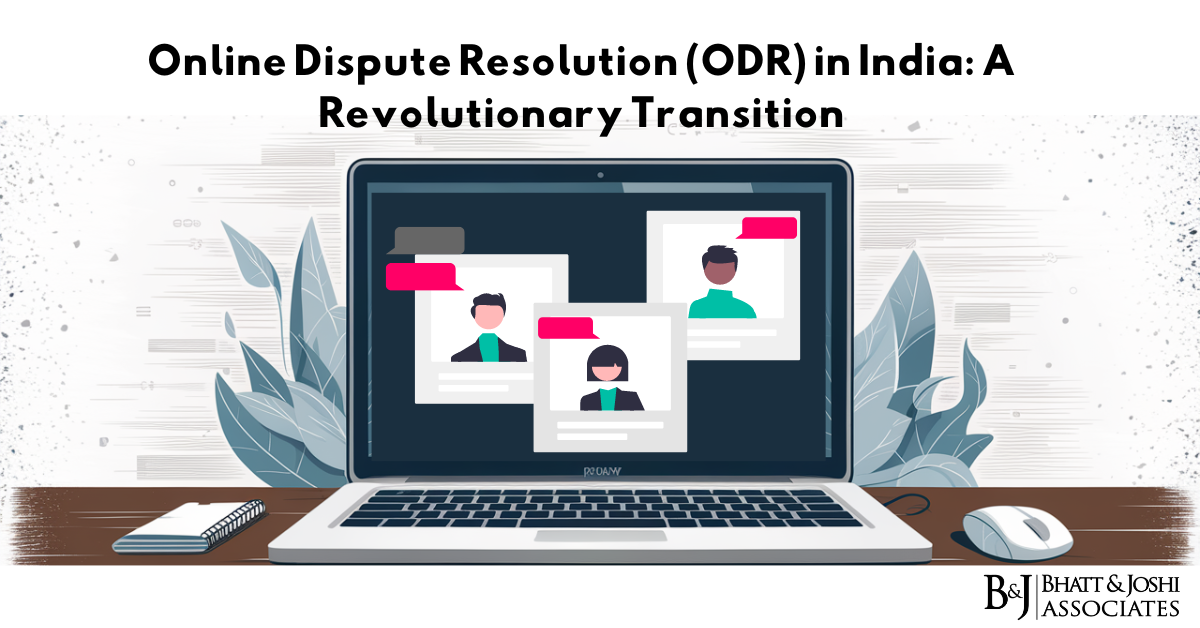Online Dispute Resolution (ODR) in India: A Revolutionary Transition
Introduction to Online Dispute Resolution in India
Online Dispute Resolution (ODR) in India represents a significant shift from traditional courtrooms to a digital justice delivery system. It aims to provide accessible, resilient, and efficient dispute resolution beyond the constraints of physical courts. Initiatives like the eCourts Mission Mode Project underscore the judiciary’s commitment to adopting Information and Communication Technology (ICT) for streamlined dispute resolution, aligning with the principle of ‘justice for all’. The COVID-19 pandemic has further emphasized the need for trust, assurance, and efficiency in economic recovery, positioning ODR as a crucial solution. Leveraging advancements in Artificial Intelligence (AI), big data, Machine Learning (ML), and blockchain, ODR seamlessly integrates into legal procedures, including blockchain-enabled arbitration for smart contracts. ODR goes beyond traditional Alternative Dispute Resolution (ADR) mechanisms by potentially serving as a fourth party equipped with algorithmic tools for intelligent resolution assistance. Its evolution has progressed through stages: initial adoption by e-commerce platforms, emergence of ODR startups, and incorporation by governments and judiciaries.
Legal Framework and Global Expansion of Online Dispute Resolution
From a legal standpoint, ODR in India is supported by frameworks such as the Code of Civil Procedure, 1908, the Arbitration and Conciliation Act, 1996, and the Information Technology Act, 2000. These laws endorse ADR methods, including ODR, and provide a harmonized standard for its implementation. Globally, ODR platforms handle various disputes ranging from online transactions to conventional issues like labor and tenancy disputes. Government-operated ODR platforms in countries like Brazil, European Union, Hong Kong, Mexico, South Korea, United Kingdom, and United States manage consumer disputes, labor disputes, and more. Court-annexed ODR platforms in countries like Canada, China, Singapore, UAE, United Kingdom, and United States facilitate civil and administrative dispute resolution through online mediation, arbitration, and negotiation.
Online Dispute Resolution Initiatives in India
The Indian Government has recognized the potential of ODR and launched several initiatives to support its implementation. These include initiatives by organizations like NIXI, Consumer Affairs, Department of Justice, MSME SAMADHAAN Portal, and RBI’s ODR Policy on Digital Payments. Legislative support for ODR technology is evident in acts like the Indian Evidence Act, 1872, and the Information Technology Act, 2000. The growth of ODR in India has been facilitated by events like the E-ADR Challenge and collaborations between the private sector and the judiciary, as seen in e-Lok Adalats. Moreover, the Department of Legal Affairs has invited applications from institutes providing ADR/ODR services to host a list of service providers on its website, providing recognition and legitimacy to ODR startups.
Challenges Faced in Adoption of Online Dispute Resolution
Despite its potential, ODR adoption in India faces several challenges. These challenges can be categorized into structural, behavioral, and operational challenges. Structural challenges include the need for a robust digital infrastructure, broad digital literacy, and addressing the divide in access to technology. Behavioral challenges encompass building awareness and trust in Online Dispute Resolution services, overcoming legal culture barriers, and addressing concerns related to government and Public Sector Undertakings (PSUs) participation. Operational challenges involve ensuring privacy and confidentiality, availability of neutrals, addressing archaic legal processes, and enforcement of ODR outcomes.
Recommendations and Future Outlook
To address these challenges, recommendations include investing in a robust technology infrastructure, building awareness about Online Dispute Resolution, fostering trust in ODR services, and collaborating with neutrals and stakeholders. Legislative amendments to recognize online arbitration and mediation, updating court procedures to acknowledge ODR, and introducing online notarization provisions are suggested. ODR startups in India like CADRE, SAMA, CODR, AGAMI, Presolv360, and others play a vital role in providing accessible and efficient dispute resolution services. Continued innovation, collaboration, and regulatory support are essential for the growth and success of Online Dispute Resolution (ODR) in India.
 Whatsapp
Whatsapp


